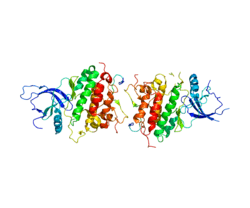ERRFI1
ERBB receptor feedback inhibitor 1 is a protein that in humans is encoded by the ERRFI1 gene.[5][6][7][8][9]
MIG6 is a Cytoplasmic protein whose expression is upregulated with cell growth (Wick et al., 1995). It shares significant homology with the protein product of rat gene-33, which is induced during cell stress and mediates cell signaling (Makkinje et al., 2000; Fiorentino et al., 2000).[supplied by OMIM][9]
Interactions
ERRFI1 has been shown to interact with Stratifin[10] and CDC42.[5]
gollark: Really? Reusable water bottles aren't that common as far as I know.
gollark: But do they drink it FROM BOTTLES?
gollark: And the water bottle suggests that it's somewhere where people drink water.
gollark: Also, it implies they don't spend that much on equipment, because fancier schools waste money on big LCDs or bother to line up their projectors.
gollark: I looked it up in the global projector database™, obviously.
References
- GRCh38: Ensembl release 89: ENSG00000116285 - Ensembl, May 2017
- GRCm38: Ensembl release 89: ENSMUSG00000028967 - Ensembl, May 2017
- "Human PubMed Reference:". National Center for Biotechnology Information, U.S. National Library of Medicine.
- "Mouse PubMed Reference:". National Center for Biotechnology Information, U.S. National Library of Medicine.
- Makkinje A, Quinn DA, Chen A, Cadilla CL, Force T, Bonventre JV, Kyriakis JM (June 2000). "Gene 33/Mig-6, a transcriptionally inducible adapter protein that binds GTP-Cdc42 and activates SAPK/JNK. A potential marker transcript for chronic pathologic conditions, such as diabetic nephropathy. Possible role in the response to persistent stress". The Journal of Biological Chemistry. 275 (23): 17838–47. doi:10.1074/jbc.M909735199. PMC 3668664. PMID 10749885.
- Chrapkiewicz NB, Davis CM, Chu DT, Caldwell CM, Granner DK (August 1989). "Rat gene 33: analysis of its structure, messenger RNA and basal promoter activity". Nucleic Acids Research. 17 (16): 6651–67. doi:10.1093/nar/17.16.6651. PMC 318357. PMID 2780291.
- Fiorini M, Ballarò C, Sala G, Falcone G, Alemà S, Segatto O (September 2002). "Expression of RALT, a feedback inhibitor of ErbB receptors, is subjected to an integrated transcriptional and post-translational control". Oncogene. 21 (42): 6530–9. doi:10.1038/sj.onc.1205823. PMID 12226756.
- Fiorentino L, Pertica C, Fiorini M, Talora C, Crescenzi M, Castellani L, Alemà S, Benedetti P, Segatto O (October 2000). "Inhibition of ErbB-2 mitogenic and transforming activity by RALT, a mitogen-induced signal transducer which binds to the ErbB-2 kinase domain". Molecular and Cellular Biology. 20 (20): 7735–50. doi:10.1128/MCB.20.20.7735-7750.2000. PMC 86354. PMID 11003669.
- "Entrez Gene: ERRFI1 ERBB receptor feedback inhibitor 1".
- Benzinger A, Muster N, Koch HB, Yates JR, Hermeking H (June 2005). "Targeted proteomic analysis of 14-3-3 sigma, a p53 effector commonly silenced in cancer". Molecular & Cellular Proteomics. 4 (6): 785–95. doi:10.1074/mcp.M500021-MCP200. PMID 15778465.
Further reading
- Zhang YW, Vande Woude GF (March 2007). "Mig-6, signal transduction, stress response and cancer". Cell Cycle. 6 (5): 507–13. doi:10.4161/cc.6.5.3928. PMID 17351343.
- Wick M, Bürger C, Funk M, Müller R (August 1995). "Identification of a novel mitogen-inducible gene (mig-6): regulation during G1 progression and differentiation". Experimental Cell Research. 219 (2): 527–35. doi:10.1006/excr.1995.1261. PMID 7641805.
- Hackel PO, Gishizky M, Ullrich A (December 2001). "Mig-6 is a negative regulator of the epidermal growth factor receptor signal". Biological Chemistry. 382 (12): 1649–62. doi:10.1515/BC.2001.200. PMID 11843178.
- Tsunoda T, Inokuchi J, Baba I, Okumura K, Naito S, Sasazuki T, Shirasawa S (October 2002). "A novel mechanism of nuclear factor kappaB activation through the binding between inhibitor of nuclear factor-kappaBalpha and the processed NH(2)-terminal region of Mig-6". Cancer Research. 62 (20): 5668–71. PMID 12384522.
- Saarikoski ST, Rivera SP, Hankinson O (October 2002). "Mitogen-inducible gene 6 (MIG-6), adipophilin and tuftelin are inducible by hypoxia". FEBS Letters. 530 (1–3): 186–90. doi:10.1016/S0014-5793(02)03475-0. PMID 12387890.
- Anastasi S, Fiorentino L, Fiorini M, Fraioli R, Sala G, Castellani L, Alemà S, Alimandi M, Segatto O (July 2003). "Feedback inhibition by RALT controls signal output by the ErbB network". Oncogene. 22 (27): 4221–34. doi:10.1038/sj.onc.1206516. PMID 12833145.
- Xu D, Makkinje A, Kyriakis JM (January 2005). "Gene 33 is an endogenous inhibitor of epidermal growth factor (EGF) receptor signaling and mediates dexamethasone-induced suppression of EGF function". The Journal of Biological Chemistry. 280 (4): 2924–33. doi:10.1074/jbc.M408907200. PMID 15556944.
- Keeton AB, Messina JL (April 2005). "Modulation of Elk-dependent-transcription by Gene33". Journal of Cellular Biochemistry. 94 (6): 1190–8. doi:10.1002/jcb.20370. PMID 15696545.
- Benzinger A, Muster N, Koch HB, Yates JR, Hermeking H (June 2005). "Targeted proteomic analysis of 14-3-3 sigma, a p53 effector commonly silenced in cancer". Molecular & Cellular Proteomics. 4 (6): 785–95. doi:10.1074/mcp.M500021-MCP200. PMID 15778465.
- Anastasi S, Sala G, Huiping C, Caprini E, Russo G, Iacovelli S, Lucini F, Ingvarsson S, Segatto O (June 2005). "Loss of RALT/MIG-6 expression in ERBB2-amplified breast carcinomas enhances ErbB-2 oncogenic potency and favors resistance to Herceptin". Oncogene. 24 (28): 4540–8. doi:10.1038/sj.onc.1208658. PMID 15856022.
- Ballarò C, Ceccarelli S, Tiveron C, Tatangelo L, Salvatore AM, Segatto O, Alemà S (August 2005). "Targeted expression of RALT in mouse skin inhibits epidermal growth factor receptor signalling and generates a Waved-like phenotype". EMBO Reports. 6 (8): 755–61. doi:10.1038/sj.embor.7400458. PMC 1369136. PMID 16007071.
- Zhang YW, Staal B, Su Y, Swiatek P, Zhao P, Cao B, Resau J, Sigler R, Bronson R, Vande Woude GF (January 2007). "Evidence that MIG-6 is a tumor-suppressor gene". Oncogene. 26 (2): 269–76. doi:10.1038/sj.onc.1209790. PMID 16819504.
External links
This article is issued from Wikipedia. The text is licensed under Creative Commons - Attribution - Sharealike. Additional terms may apply for the media files.




